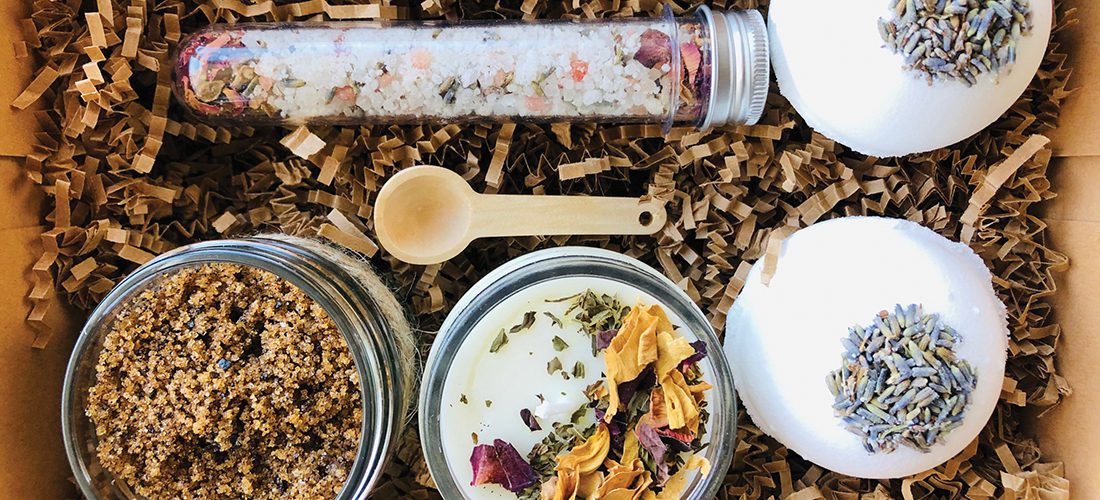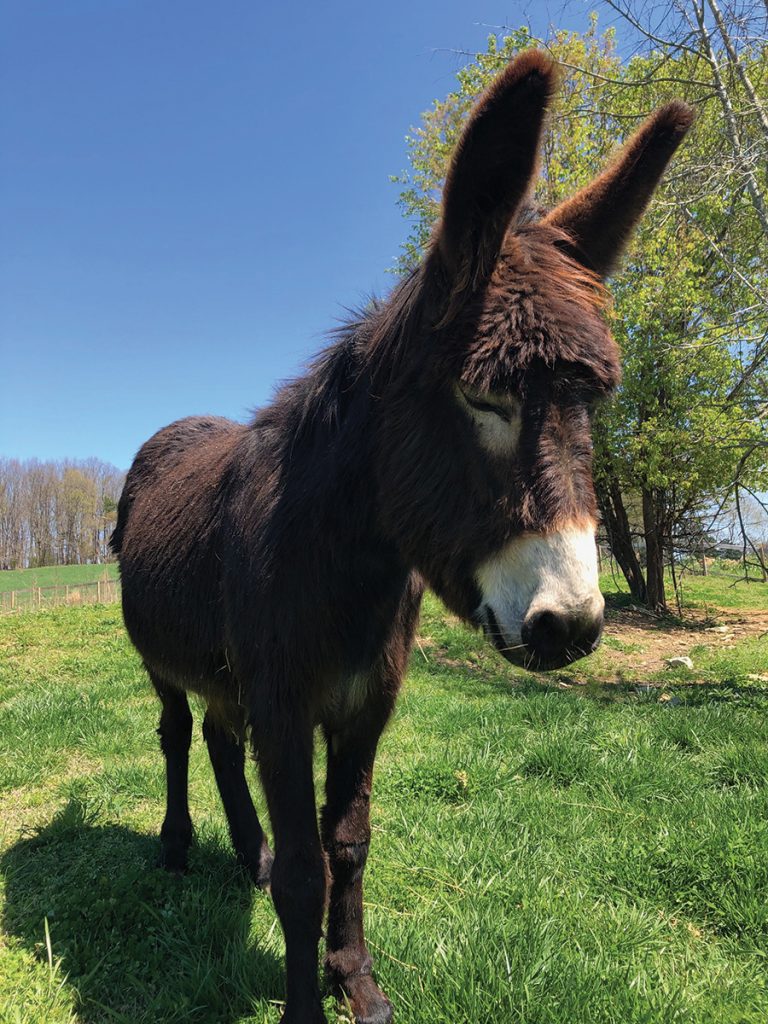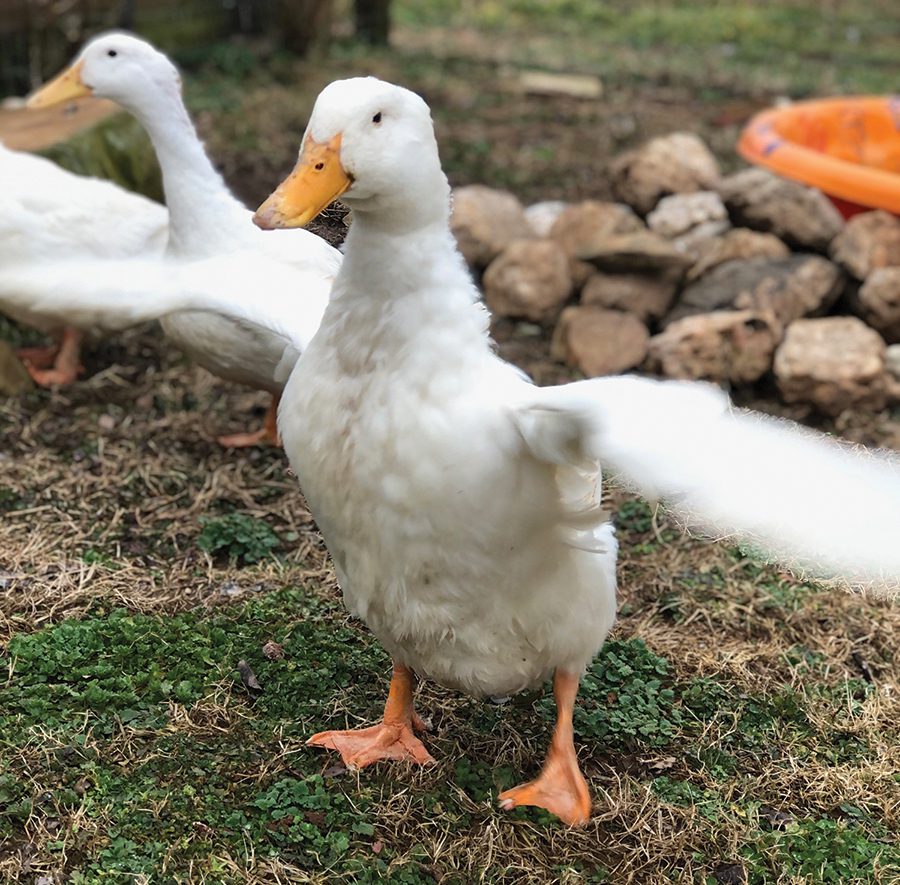Farming, she wrote
June 1, 2021

A Charlotte-area writer and her husband move to the country, providing a haven for animals and, through their handmade bath products, a haven for humans, too.
by Page Leggett
“I’m staring out my window at the Quackertons,” writer Jodi Helmer tells me. The Quackertons are the ducks she and her husband, Jerry Porter, recently introduced to their 3-acre farm in Albemarle, about an hour east of Charlotte.
“I love thinking that people are appreciating a small piece of our farm in a different way than they would normally experience a farm product,” says Helmer, whose work has appeared in National Geographic Explorer, Smithsonian.com, NPR and others. “We call it farm-to-bathtub.”
She’s referring to the handmade bath salts, scrubs and lotions she and Porter make from the flowers and herbs they grow. They sell them on their Etsy shop, Naughty Donkey Farm, a nod to their rescue donkey, Waylon Jennings.
“When we rescued Waylon Jennings, he was almost feral,” Helmer recalls. “He was too young to be gelded. Our friends’ little girl was over one day, and she wanted to feed our goats. Waylon Jennings kept pushing the goats out of the way. She told him, ‘You’re a naughty donkey,’ and it stuck.”
Waylon has since been gelded and therefore tamed — but he’s gone blind. “He’s not running after the smaller farm animals anymore,” Helmer says. “But he’ll bite you in a red-hot second if you’re not careful.”

Here, it doesn’t matter how much an animal misbehaves or how feeble it gets. The animals on this Stanly County farm “don’t have to earn their keep in any way, shape or form,” Helmer says.
“The chickens, all named for country music stars or songs — Rosanne Cash, June Carter Cash, Naomi Judd, Pam Tillis, Jolene and Ruby — provide us with eggs, which we eat or give away. The five rescue goats provide us with amusement. We jokingly call them ‘pasture art.’ They’re fun to look at, and they’re great stress relievers.”
Helmer and Porter have long taken in rescue dogs, and they tended a vegetable and herb garden as big as their small Charlotte yard allowed before moving to the country in 2016. After they moved, they had a lot more space for rescue animals, flowers and veggies. At the time we spoke, they were growing lettuce, broccoli, cauliflower, onions, kale, Brussels sprouts — and loofah. (We’ll get to that shortly.)
“Originally, our plan was to grow ingredients for tea,” says Helmer, who has written six books, including Growing Your Own Tea Garden and Protecting Pollinators: How to Save the Creatures That Feed Our World. “I have always plucked things from the garden for our table, and I’m a big tea drinker,” she says. “And when I was doing research for the book, I thought: We could turn this into a small tea company. The actual tea plant, Camellia sinensis, grows well in North Carolina. That was our plan — until I started researching laws around making food products. We would’ve had to rent a commercial kitchen, and it just opened up this whole other level of crazy. We did not want to go down that road.”

With scents such as vanilla-coffee bean, green tea-mint and rosemary-lemongrass, you may wish these bath products were edible. While researching her book on tea, Helmer would pin tea recipes on a Pinterest board. She came across bath teas and discovered “this whole other world where people were using ingredients from their gardens in bath and body products.” The hobby farmers were already growing a number of the necessary ingredients — lavender, rosemary, mint and roses.
“The idea of me making beauty products was funny,” Helmer says. “I’m a very natural girl. My idea of makeup is Chapstick. But this is stuff that I use. I love a good bath. When we renovated this house, I insisted we put in a big clawfoot tub.”
Helmer started experimenting, making bath salts to give as gifts. When she posted a photo of the salts on Facebook, several people asked if they could buy them. “And I said, ‘Why, sure you can,’ and it snowballed from there.” The couple had an Etsy shop they opened in 2019 to sell Porter’s handmade wood products — barnwood angels, trays made from reclaimed wood, and others. Now, they both sell their wares on Etsy.
They share the labor on the farm, too. “Jerry tends most of the garden,” Helmer says. “He makes all of the bath bombs, because they’re very tricky to make, and I do not have the patience. I do the salt and sugar scrubs, and he cuts and peels the loofahs. It’s a team effort.”
Cuts and peels loofahs?

“I didn’t realize there would be a demand,” Helmer says. “I thought everybody knew that loofahs were an easy-to-grow plant.” (Um, no.) “They grow on a vine, like a cucumber, and you take them off the vine and wait for them to dry.”
Helmer and Porter are expanding their cut-flower gardens as well. “The plan is to have once-a-month open houses where people can pick flowers, make their own bouquets, buy vegetables and interact with the animals.”
Just watch out for Waylon Jennings. SP
Soak up the farm. Find Naughty Donkey bath products on Etsy at NaughtyDonkeyFarm. Stay updated on the Quackertons, Waylon Jennings and the rest of the menagerie on Instagram @naughtydonkeyfarm





